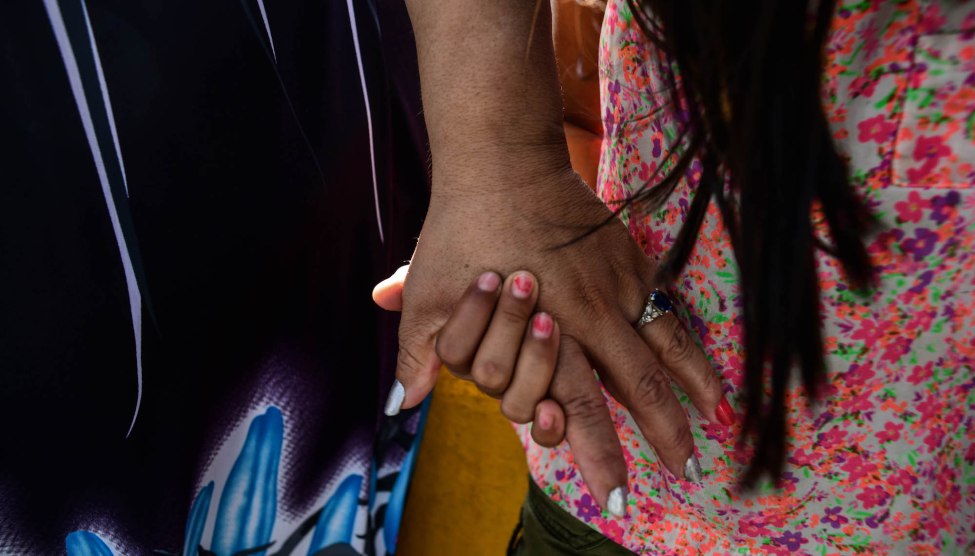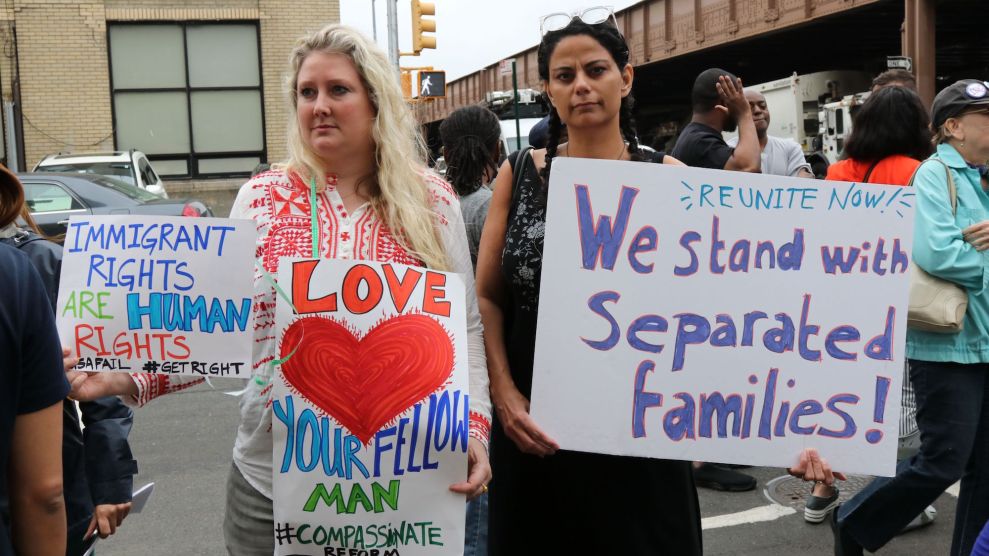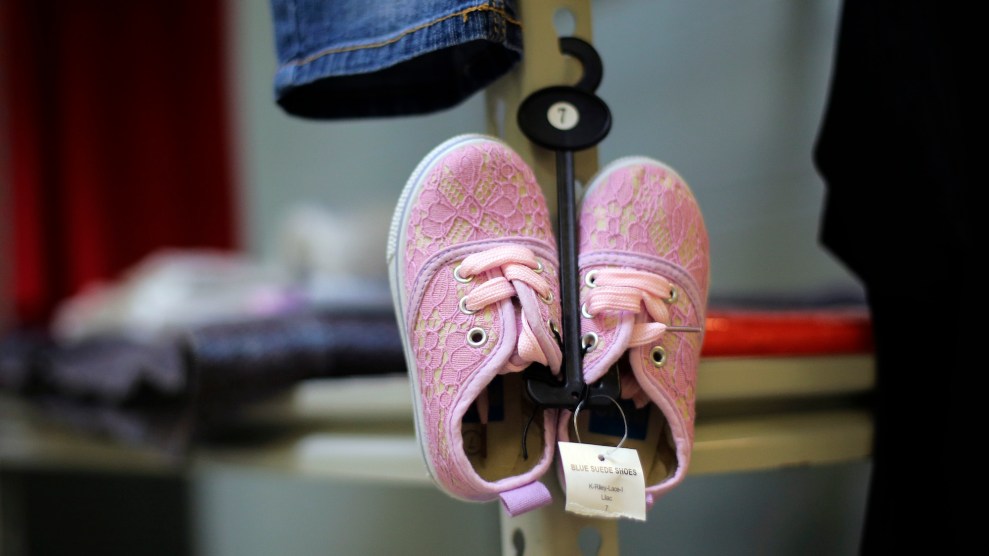
A Honduran woman named Irene waited with her daughters Alondra, 15, and Valentina, 9 on the Mexican side of the US border to apply for asylum. Miguel Juarez Lugo/ZUMA Wire
This story was originally published by ProPublica.
The employees were in the ninth hour of another 12-hour shift Saturday afternoon at a converted Walmart now housing immigrant boys when a teenage resident took off.
Staff members at the Casa Padre shelter had been trying for weeks to connect the 15-year-old with family. It didn’t seem to be going anywhere. As a soccer game began, staffers watched as the boy dashed from the dirt field, clambered over the chain-link fence, jumped into a lake next to the building, then disappeared from view.
He wasn’t the first child to run away from a facility operated by the Southwest Key network, the largest licensed shelter provider for immigrant children caught crossing the border. Staff members went looking for him to try to convince him to stay, then stopped, accepting his departure with equal measures of exhaustion and futility.
“The staff came in at 6 a.m. This happened at 3, 3:30,” said one employee at the shelter. “People are just too tired. They don’t have the strength…Some of them are just like, ‘You know what? Just go.'”
ProPublica spent the past several days interviewing seven current and former employees from Southwest Key facilities in Texas and Arizona who spoke on the condition of anonymity. “We have too many kids and not enough staff,” one employee said.
Their observations, coupled with court, police and regulatory records, provide a window into what it’s like to work in a system pushed into overdrive, straining to serve an increasing number of traumatized kids amid the uncertainty of America’s immigration system.
“The influx of immigrant children has stressed the entire system,” said Southwest Key spokesman Jeff Eller. “We are no different.”
Southwest Key is equipped to care for 5,427 kids across 26 facilities in Texas, California, and Arizona. Ninety percent crossed the border alone. On average, kids spend 52 days in Southwest Key shelters, then go home with friends or relatives who serve as their sponsors as they wait to make their asylum cases. Those who don’t have someone here, or have sponsors afraid of submitting to a background check, can stay much longer.
The children who have been separated from a parent under the Trump administration’s zero-tolerance immigration policy face even more challenges, as caseworkers struggle to locate parents in Immigration and Customs Enforcement custody, some of whom have already been swiftly returned to their countries. It’s unclear how long those kids could stay at the shelters.
“If you are stuck there a long time, it will change you,” one employee said. “In a matter of time, this kid is going to become more aggressive. He is just there like a little animal being caged.”
Some punch walls, or other kids, or staff, according to employees and records. Some cut themselves or attempt suicide. After ending up in the hospital multiple times, one boy wrote a staff member to apologize: “You told me many times not to hurt myself but I continued to do it and now I am here.”
Some take off running. One employee remembered a kid leaving during shift change, when supervision was scant; another recalled a runaway layering on three outfits at once for the journey. Sometimes, cops find the kids. Sometimes, they don’t.
Since October, 42 children have run away from the nonprofit’s shelters. Eller says Southwest Key considers these kids to have voluntarily left. “As a licensed child care center, if a child attempts to leave any of our facilities, we cannot restrain them,” he said. “We are not a detention center.”
Though dozens of federal contractors house immigrant youth, Southwest Key, founded in 1987, leads the pack, receiving more than $950 million in federal contracts since 2015 for the shelters and other services. Along with housing immigrant children, the organization operates youth justice programs, charter schools and a series of business ventures that have their profits routed back into Southwest Key. A spokesperson said 85 percent of funds paid to Southwest Key by the Office of Refugee Resettlement, an arm of the federal government established to support refugees and asylum-seekers, are directed to the costs of shelter, food, clothing, water, electricity, and shoes.
The organization has long been hailed by immigration advocates as a humane, culturally sensitive alternative to for-profit and government-run facilities. Staffers are expected to speak Spanish and taught to think of the residents as “clients.” Kids spend their days taking classes, playing basketball, watching movies and weaving brightly colored keychains. Basic medical help, education and counseling are all provided onsite.
The American Civil Liberties Union represented Southwest Key in a 2015 lawsuit against Escondido, California, alleging the city was unfairly blocking the organization from opening a new children’s shelter there. And UnidosUS, formerly known as the National Council of La Raza, one of the leading Latino advocacy organizations in the country, has for years provided Southwest Key with grants.
Clarissa Martínez de Castro, a deputy vice president with UnidosUS, said the organization continues to support the nonprofit. The Trump administration, not Southwest Key, is responsible for separating children from their parents, she said. “If the government is going to do this, these children need folks who are going to provide them the best care possible.”
Recent media scrutiny, including ProPublica‘s interviews and reviews of records, has not unearthed the kinds of egregious abuse or neglect at Southwest Key facilities that plagues more troubled institutions like some foster homes or other immigrant youth shelters.
Still, police show up to Southwest Key facilities with some regularity to respond to reports of runaways and suicide attempts. They arrive in the aftermath of fights between residents, or after a staff member has been hit while trying to subdue an angry kid. The police reports, which ProPublica obtained for four Southwest Key facilities in Brownsville, give a limited picture of complaints, since a public records law keeps private reports about juvenile defendants or victims who are 16 or younger.
Former residents have said they were well treated—in sharp contrast to descriptions of their experiences at US Border Patrol facilities when they first arrived.
Instead, concerns about Southwest Key center on its staffing practices.
Arizona regulatory records reviewed by ProPublica show that state inspectors found fault with Southwest Key’s backgrounding process. In October, the nonprofit was fined for a number of shortcomings, including failing to provide records proving that some employees had been fingerprinted and allowing an employee to work 113 days without applying for a fingerprint clearance card.
Texas Monthly reported that last year, Southwest Key’s Casa Padre shelter in Brownsville employed a case manager who had previously been arrested on charges of child pornography possession. When the nonprofit’s supervisors discovered his arrest record, the case manager was suspended and ultimately let go—but not until he had been allowed direct access to unaccompanied minors. A Southwest Key spokeswoman said the company’s background check did not catch his arrest because it did not result in a conviction, but the organization acted as soon as it became aware of the allegations.
The hard-to-predict ebbs and flows of immigrants coming across the border make properly staffing Southwest Key’s facilities a challenge. Last spring, after the number of unaccompanied children entering the country dropped, the nonprofit was instructed by federal authorities that they would need half as many beds. Southwest Key laid off almost 1,000 employees.
But by December, the organization was again looking to staff up. “Do you want to make a difference in the lives of youth?” read one ad.
To get a job as a youth care worker, responsible for handling intake of new children, supervising them and assisting with educational events, one former Arizona employee said, “You could say, ‘Oh I babysit my sister’ and they’d hire you.'”
Another former staffer in Arizona said she had no teaching experience when Southwest Key hired her as a teacher. “I was very surprised they hired me, honestly. I was very surprised,” she said. “I went to a job fair and as soon as I got to the interview, they offered me the position.”
Southwest Key’s spokesman said the nonprofit has “rigorous hiring standards” and that “no employee is officially hired until they have completed the entire onboarding process which includes background clearances.” He said staffers undergo a minimum of 80 hours of classroom and on-the-job training before they can supervise a child, with an additional 40 hours of required training each year.
But those interviewed by ProPublica said crisis training was limited to one day, and wasn’t enough to help them navigate the sorts of situations they routinely encounter. “If I was put in a place to do (crisis intervention), I don’t think I would have been able to,” said a former Arizona staffer. Another employee in Texas said colleagues avoid intervening if a teen is acting out because they feel unprepared. “I don’t think we got a proper training,” the employee said. “Not for what you are about to go into.”
Staffers say they wear multiple hats to fill gaps in coverage. A youth care worker might be switched to security duty; a teacher might be called upon to restrain a teen on the way to the hospital. A janitor doubles as a driver.
Almost universally, employees complained of being worked to the bone. A current employee in Texas said that as new children started being bused in daily, management cancelled vacations and placed staffers on 12-hour shifts. Bathroom breaks are a challenge. Employees regularly wait hours after requesting to relieve themselves. One said a colleague got a urinary tract infection because she was forced to wait. Another recalled running into a colleague, who was distraught because she was on her period but had yet to be relieved from her post four hours after requesting a bathroom break.
Employees have been abruptly quitting.
“Staffers are working really hard right now, and we always ensure that our programs are staffed at ratio to provide care for the children in our shelters,” said Eller, the Southwest Key spokesman. “Our employees are working overtime, but they understand the need and are earning generous overtime pay. We’re also working to staff up as quickly as possible.”
The strain manifests itself in other ways. An employee at a Texas facility said the roof has been leaking and toilets are chronically clogged. Employees in Texas and Arizona said kids are sometimes left in dirty clothes. One employee, from Arizona, recalled noticing that the shoes given to a 5-year-old boy from Guatemala were way too big, but weeks passed and no one would replace them. “I’d watch him run, ‘He’s going to fall, he’s going to face plant any day now,'” she said.
Frustration boiled over when Juan Sanchez, Southwest Key’s president and founder, who was reported receiving almost $1.5 million in total compensation in 2016, recently solicited employees for donations to help the kids, money the nonprofit said goes to scholarships. Southwest Key says it has a voluntary “employee give-back program” that employees can opt into or out of at any time.
A current staffer said Sanchez congratulated the staff for their hard work—then asked for a $10 weekly donation from their paychecks.
“He made it sound like, ‘Guys, I don’t have the money, otherwise I would pay it out of my own pocket,'” the staffer said. “Man, you have millions.”
Those who stay say they do so to hold onto above-minimum-wage jobs—tough to find in Brownsville, which has an unemployment rate almost twice that of the nation—and concern for children who are alone, coping with hardship and uncertainty.
“Yes, it’s a lot of stress, but you do something,” said one employee. “You feel that you actually got to accomplish something…
“And the kids will actually ask you, are you going to come tomorrow?”















